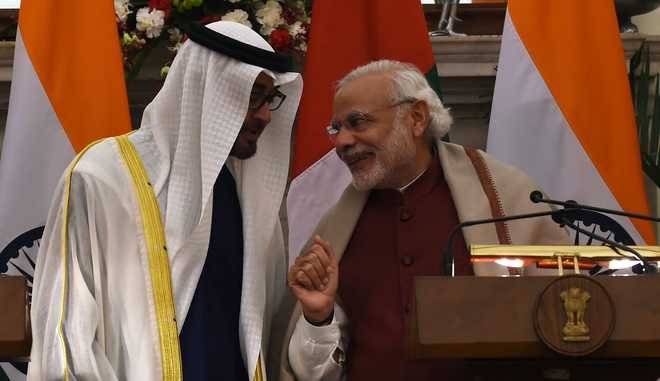New Delhi, Feb 13: Deciding to expand cooperation in combating terrorism, India and the UAE today came out strongly against use of terror as an “instrument of state policy” and asked countries to cut “all support” to militant groups operating from their soil.
Without naming any country, both sides, in a joint statement, also condemned use of religion to justify, support and sponsor terrorism while expressing concern over radicalisation and religious intolerance. They said nations must control activities of ‘non-state actors’.
On trade, a major aspect of bilateral ties, the statement, issued a day after Prime Minister Narendra Modi and Crown Prince of Abu Dhabi Sheikh Mohammed bin Zayed Al Nahyan held extensive talks, said UAE will ramp up investment in diverse sectors in India including railways, petroleum, roads, ports and shipping.
It said both leaders looked forward to the early signing of the Comprehensive Strategic Partnership Agreement to further expand ties and resolved to build on the momentum by pursuing collaboration in trade and investment, security and defence, energy and climate change among others.
The talks produced “far reaching cooperation”, Spokesperson in the Ministry of External Affairs said.
The two sides also agreed to bolster strategic ties by continuing to work closely on a range of security issues, particularly on counter-terrorism, maritime security, and cyber-security, the statement said.
The two countries have signed nine pacts covering a range of key areas. UAE Ambassador Ahmed Al Banna, earlier this week, had said 16 MoUs, including one on cooperation in civil nuclear energy may be signed. No nuclear pact was signed and there was no indication why the figure for MoUs given by the envoy did not materialise. When asked, sources only referred to the inter-agency processes without elaborating.
On dealing with terrorism, the statement said they deplored the “use of double standards” in addressing the challenge and agreed to strengthen cooperation in combating terrorism both at the bilateral level and within the multilateral system.
“They reiterated their condemnation for efforts, including by states, to use religion to justify, support and sponsor terrorism against other countries, or to use terrorism as instrument of state policy.
“They further deplored efforts by countries to give religious and sectarian colour to political issues and pointed out the responsibility of all states to control the activities of the so-called ‘non-state actors’, and to cut all support to terrorists operating and perpetrating terrorism from their territories against other states,” the statement said.




























